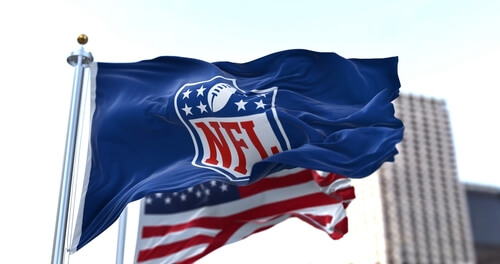
- building an audience
- promoting events
- supporting athletes
Organizational-Level Sports Marketing
At the “macro” level of the sports marketing industry, professionals work to promote large organizations within the industry. This includes major sports organizations like:
- the Olympics
- the National Football League
- FIFA
It also includes dozens of other professional leagues that operate in the United States and around the world. So, what do sport marketers do? Sports marketing managers in this capacity are concerned with selling the message of the organization’s sport or the mission of its existence. Those who work for the International Olympic Committee, for instance, are primarily working to showcase the Olympics’ charitable outreach and its capacity to bring the world together with athletics. A professional sports marketing team may work on promotional campaigns for these organizations. They develop marketing strategies to bring awareness and promote their organization. Sometimes, they may conduct market research to get a better understanding of audience expectations.
Within the NFL, sports marketing professionals try to showcase their sport as being true Americana, a pastime that connects with the American way of life. FIFA officials would be likely to showcase their sport as the world’s most popular among every age group. No matter the organization, sports marketers in this capacity are concerned with a message that bolsters their organization and promotes a sport in general.
Teams and Athletes: The Next Building Block of Sports Marketing
The thing that draws so many fans to athletics is the narrative of underdog sports teams, heroic athletes, and accomplishments that the average person simply cannot achieve on a daily basis. Many people look up to their local teams and favorite athletes for these very reasons. Marketers are the ones who make that kind of respect and enthusiasm possible. While many people work to promote large sports organizations that oversee teams, it would be impossible for those organizations to continue without fan support. Sports marketers working with teams and athletes strive to:
- create engaging campaigns that build team spirit
- focus on individual and season ticket sales
- “sell” athletes as heroes
Marketing at this level is dominated by storytelling. The goal is to showcase a team’s strengths and tell the story of their accomplishment. It is also important to highlight the individual athletes who come together when a play is called. They also tell the story of each athlete, from their days in high school sports to their performance in college and their position in a professional draft. Giving fans this context opens them up to a richer, more satisfying experience, and builds the team’s sales accordingly.
Sport-Based Promotion: The Final Building Block
Professional sports require a new group of talented athletes each year to fill vacancies in a team’s roster. Those athletes come from college programs and high schools, and they often chose to play the sport because they saw marketing material promoting its style of competition and camaraderie. Many sports marketers work in roles that simply promote the ideals of sports like soccer, baseball, lacrosse, rugby, and many others. They target younger demographic groups and funnel prospective players to community teams, junior varsity leagues, and high school sports organizations.
Related Resource: Sports Scout
What Skills are Needed to be a Successful Sports Marketer?
Do you think you have what it takes to be a sports marketing manager? While a degree can give you the knowledge and skills needed to be successful in the industry, there are some skills that are needed to rise to the top. We highlight some of the most important skills sports marketers need for success.
Ability to Prioritize
Sports marketing professionals have a lot on their plate. They might be working on a promotional effort that requires them to complete tasks ranging from developing a budget to writing a press release. Knowing how to prioritize these tasks is critical to meeting deadlines and keeping in control of the project.
Leadership Skills
Leadership skills are especially important for aspiring sports marketing managers. The field is very fast paced and sports marketers with leadership skills are in demand. If something goes awry, it becomes necessary for someone to step up to present solutions and see things through until the end.
Communication Skills
Communication skills are essential in marketing, and sports marketing is no different. Sports marketers needs to effectively write a variety of communications for internal and external audiences. They must be clear and concise in their message.
An Expansive Industry for the Sports-Enthusiast Marketer
It is relatively straight forward to explain sport marketing. Marketing in the professional sports industry means accommodating:
- the sports themselves
- the professional organizations that oversee them
- the athletes or teams that make weekly match-ups exciting to watch
As a sports marketer, it’s possible to choose from any of these three pursuits in order to enjoy a rewarding, exciting career in this growing industry.
Related Resources:


